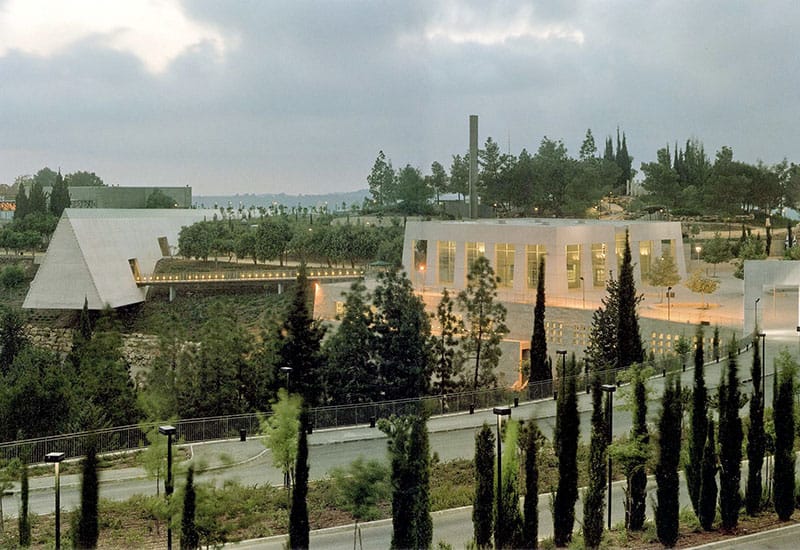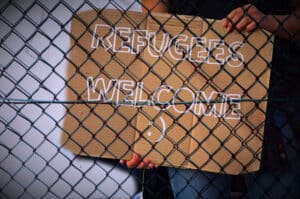
As we exited Yad Vashem, The World Holocaust Remembrance Center in Jerusalem, the sun was setting and the valley was covered in pink and orange light. It was so crowded that I quickly snapped a photo and stepped back, feeling uneasy about the question posed to us by our guide: “What will you do to make sure this never happens again?”
As I traveled throughout Israel and Palestine, I kept thinking about Rachel weeping in the wilderness, which we hear about both from sacred texts and from several traditions. In Jeremiah 31 and again in Matthew 2, the picture is painted of the ancestress Rachel, weeping for the children of her descendants. In both stories, the people are facing the death of the young, the death of the future—through fear-fueled violence, conflict, or tyrannical government. The spirit of Rachel is rising in the cries of communities who are burying their children—something no one should ever have to do.
The spirit of Rachel is rising in the cries of communities who are burying their children.
There is a constant wilderness of weeping in this broken world. There are salty lines that flow down our cheeks making jagged lines…trees wept onto our faces…from the weeping. It is a wilderness in which we can be lost. The helplessness of losing so many of the upcoming generations—to gun violence, to untimely death from lack of fresh food or unclean water, to police brutality and killings, to suicide and gang violence, to the funneling of marginalized youth into the cradle to prison pipeline—can feel like navigating a wilderness far too dense or dangerous to do anything but sit down and weep.
Survival is grace.
“The people who survived the sword found grace in the wilderness…” (Jeremiah 31:2)
In Jeremiah 31, we hear of Rachel’s weeping, and it also speaks of a grace found in the wilderness. Those of us who experience this wilderness of life—of being alive to the injustices of the world—find grace in the midst of it. A grace for healing in the midst of trauma, grace to speak to powers that would rather we be quiet, grace to continue to fight for the safety and liberation for generations to come.
The guide’s question made me uneasy that day because as a peacemaker dedicated to nonviolence, beloved community, and freedom of all people, I looked over her shoulder to the peaceful valley below and could hear Rachel weeping for both Israeli children and Palestinian children. The wilderness is everywhere and at home. Rwanda. Bosnia. It is happening again. Lynching, mass incarceration, and the death penalty (all which disproportionately kill people of color) in the United States. Syria and Somalia today. The world is a wilderness of weeping. Those who have not survived the violence are crying out, and those of us with the grace of air still in our lungs must find a way to continue to live, love, and make those cries audible for all to hear.
Those who have not survived the violence are crying out, and those of us with the grace of air still in our lungs must find a way to continue to live, love, and make those cries audible for all to hear.
“What will you do to make sure this never happens again?”
Sit with this question from the Yad Vashem guide, letting your thoughts and feelings—from the Holocaust to the work of peacemaking nearest you—swirl and settle. The weight of tragedy, grief, and our responsibility to build peace and make change can be overwhelming. Make space to breathe and lament, and then make space again. Let yourself venture into the wilderness of weeping.
Micky ScottBey Jones—the Justice Doula—is a womanist contemplative activist, healer, nonviolent direct action organizer and consultant who facilitates conferences, workshops, pilgrimages, retreats and online conversations. She writes and speaks on a variety of topics including healing justice, communal self-care, contemplative activism, intersectionality and theology from the margins. She is the Director of Healing Justice with the Southern-based collective Faith Matters Network. Micky was named one of the Black Christian leaders changing the world in Huffington Post. She is a contributor at The Voices Project, The Porch Magazine, Sojourners, and Red Letter Christians. Micky has an M.A. in Intercultural Studies, and is an Associate Fellow of Racial Justice with Christians for Social Action. This article first appeared in the Lenten Devotional for Peacemakers.


